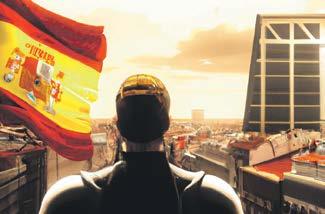
2 minute read
DIGITAL DYSTOPIA
How will Artificial Intelligence affect our lives in Spain?
By Jo Chipchase
ARTIFICIAL intelligence (AI) is being hailed by some people as the next industrial revolution. Others say it’s a danger to humanity and will soon get out of control.
American commentator, Joe Rogan, is currently voicing concern over a fake AI-generated podcast featuring an interview between him and the CEO of a company called OpenAI, Sam Altman.
On a similar theme, Berlin-based photographer, Boris Eldagsen, recently fooled the Sony World Photography Awards with an AI-generated photo. He won first prize in the creative category but did not accept the award, saying he has shown how even top professionals are unprepared for AI.
If you are new to AI, you won’t be for long. Some large investors are developing it, such as Microsoft, Amazon, Google, and IBM. If you use social media, Meta is developing AI elements for Facebook and Instagram, and Snapchat is launching an AI feature for paying users.
If you use streaming services, you’re already seen the hand of AI when it suggests films or other content you might enjoy.
So, with 2023 being the year of AI, how could its growing use affect our lives in Spain?

HERE NOW: CHAT BOTS AND IMAGE GENERATORS
Many people are signing up for the new chatbot AI apps, such as Chat GPT from OpenAI. A chatbot is an AI app where you give it prompts, or asks it questions, and it draws on a large data set to answer with the content you want (this process usually needs some refining).
The idea is that the bots can instantly ‘research’ and explain any topic in detail, and it only takes a few minutes.
The current chatbots can write articles, essays, devise book plots, and generate computer code. You can easily save yourself several hours’ work.
With image AI, the popular apps - such as DALL-E and Midjourney - use written prompts from the user to produce images. They will render anything you can describe (such as ‘Pedro Sanchez riding a Spanish bull’). And, unlike human designers using Photoshop, they do it in seconds. Seeing this speed and efficiency of these existing apps, some people fear that AI will eventually overtake or dominate humans, plunging us into a plot worthy of Netflix’s popular series, ‘Black Mirror’.
Democratic Dangers
The recently held general election might be the last campaign period unaffected by AI. The main worry is: how will voters distinguishing real content from AI-generated propaganda? Some voters already find it difficult to identify fake news on the ‘old’ social networks, such as Facebook, Instagram, and Twitter. As for YouTube, “I saw a video, so it must be true” has been a long-standing problem.
Now, there are AI voiceover apps, AI face generators, and you could ‘skin’ video content with someone else’s face – such as a politician.
Using a simple prompt on Midjourney, the reporter created a convincing image of “Boris Johnson DJ-ing at a rave in a dry, dusty riverbed in southern Spain”. OK, we know this would never happen but would your 80-year-old granny be so sure?
For the experienced user, generating AI deepfakes is easy. These are videos or audio recordings that show someone saying or doing something that isn’t real. Think of the old ‘mashup’ videos, where snippets of a politician’s voice were blended to make a funny song (such as Nigel Farage saying he loves Europe), only more sophisticated.
EMPLOYMENT – LOSSES AND GAINS
In the next few years, AI is likely to automate many jobs, particularly those involving repetitive tasks that rely on data sets – such as coding, paralegal research, analysis, etc. Warehousing is another affected field, with Amazon already deploying robots called Proteus.
AI will impact art and design, as it is cheap-
Simon Hunter simon@theolivepress.es
Alex Trelinski alex@theolivepress.es
Cristina Hodgson cristina@theolivepress.es
Walter Finch walter@theolivepress.es
OFFICE MANAGER Héctor Santaella (+34) 658 750 424 accounts@ theolivepress.es





